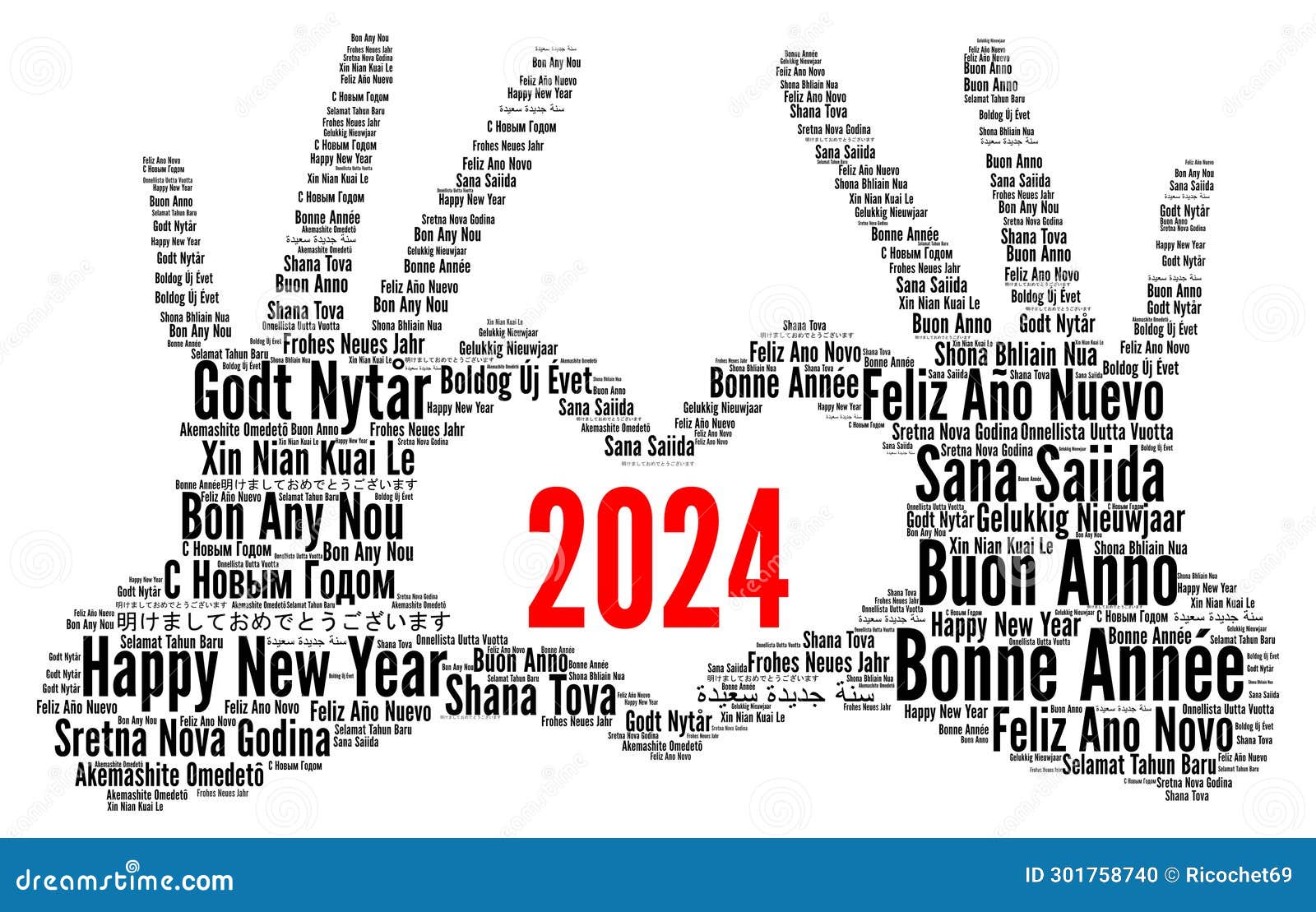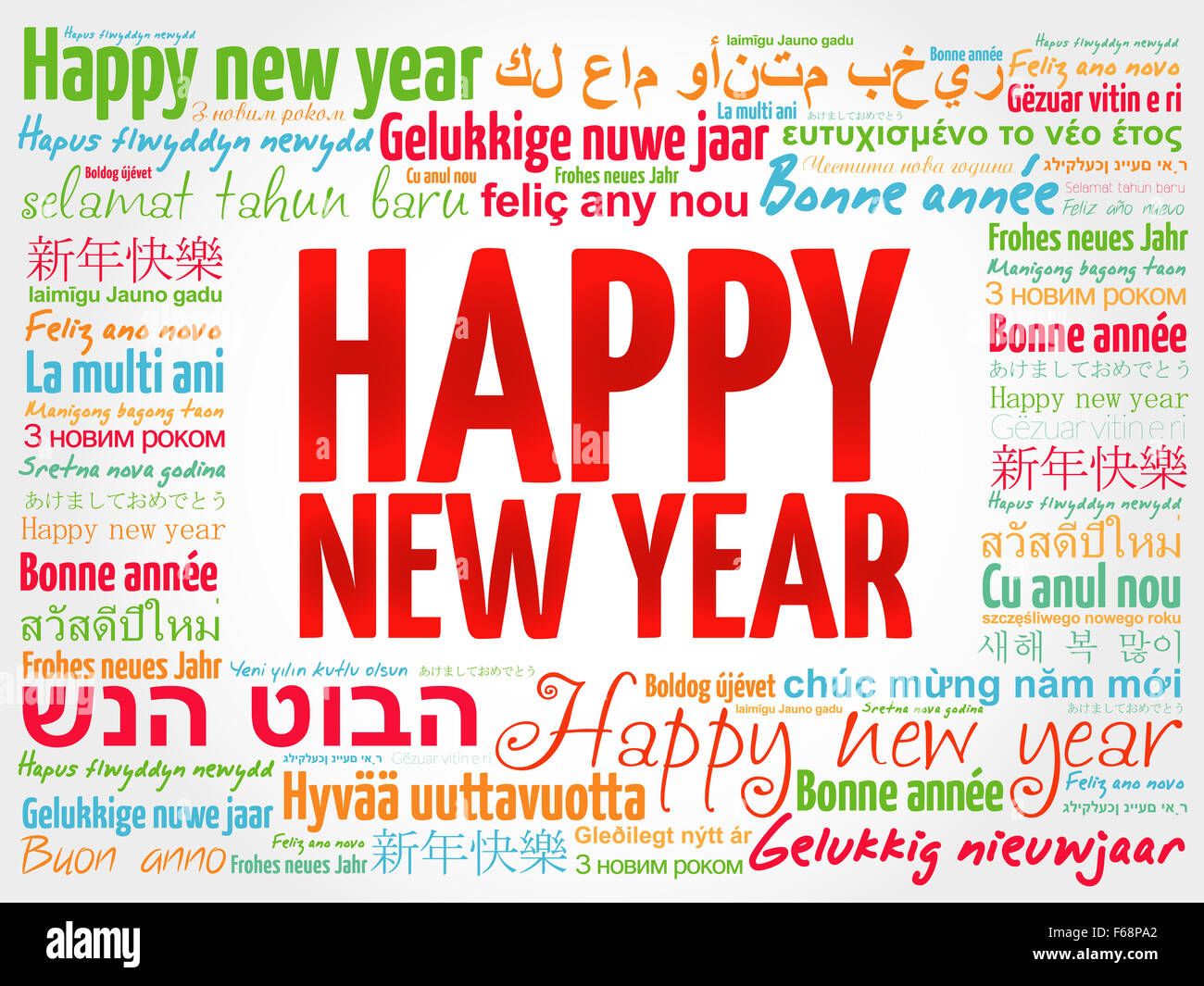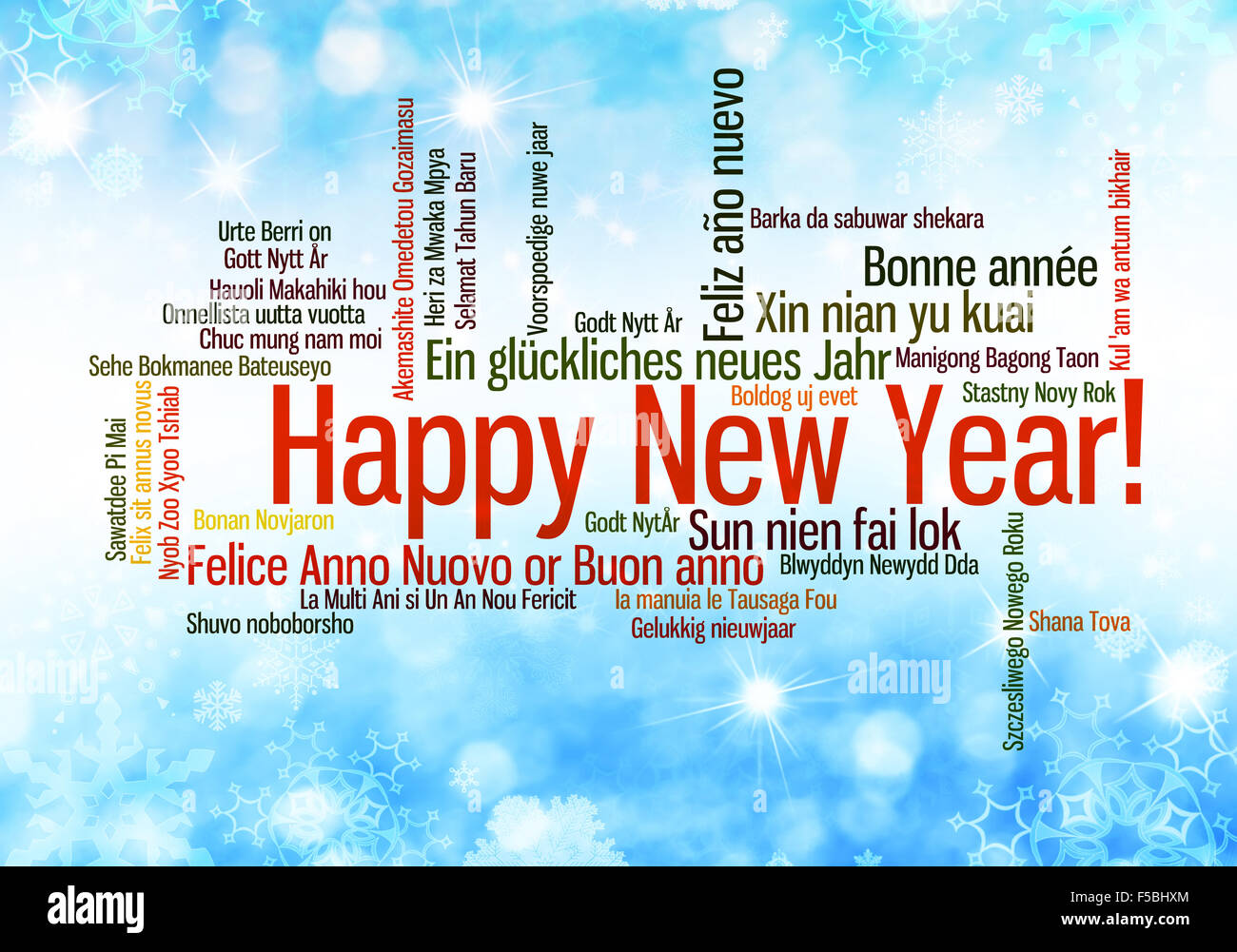Happy new year in different languages 2024 – As we approach the dawn of a new year, the world unites in a symphony of well wishes. From the bustling streets of Tokyo to the vibrant squares of Rome, the phrase “Happy New Year” echoes in a kaleidoscope of languages, each carrying its own unique cultural nuances and historical significance.
Join us on a global journey as we explore the diverse ways in which different cultures bid farewell to the old and embrace the promise of the new in 2024.
From the ancient traditions of the Chinese New Year to the modern fireworks displays that illuminate the skies of major cities, New Year’s celebrations are a testament to the human spirit’s resilience and optimism. In this comprehensive guide, we delve into the historical origins, cultural customs, and global impact of this cherished holiday.
Global Greetings: Happy New Year In Different Languages 2024
As we bid farewell to the passing year and welcome the dawn of a new one, people around the world extend heartfelt greetings to one another, expressing their hopes and aspirations for the year ahead. Here’s a glimpse into how different cultures convey their New Year wishes:
The table below presents “Happy New Year” in various languages from around the globe, along with their respective countries of origin:
Happy New Year Greetings in Different Languages
| Language | Country of Origin | Happy New Year |
|---|---|---|
| English | United Kingdom, United States | Happy New Year |
| Spanish | Spain, Mexico | ¡Feliz Año Nuevo! |
| French | France, Canada | Bonne Année |
| German | Germany, Austria | Frohes Neues Jahr |
| Chinese | China, Taiwan | 新年快乐 (Xīnnián kuàilè) |
| Japanese | Japan | 明けましておめでとうございます (Akemashite omedetō gozaimasu) |
| Hindi | India | नया साल मुबारक (Naya Saal Mubarak) |
| Russian | Russia | С Новым годом! (S Novym godom!) |
Historical Origins
The origins of New Year’s celebrations can be traced back to ancient times. In Mesopotamia, the Babylonians celebrated the new year in the spring, around the time of the vernal equinox. The Babylonians believed that the new year was a time of renewal and rebirth, and they celebrated with feasts, games, and religious ceremonies.
The ancient Egyptians also celebrated the new year in the spring, around the time of the Nile River’s annual flooding. The Egyptians believed that the flooding of the Nile brought new life and fertility to the land, and they celebrated with festivals and rituals to honor the gods.
In ancient Greece, the new year was celebrated in the summer, around the time of the summer solstice. The Greeks believed that the summer solstice was a time of great power and energy, and they celebrated with athletic competitions, musical performances, and religious ceremonies.
The ancient Romans adopted the Greek calendar and celebrated the new year in the summer. However, in 46 BC, Julius Caesar introduced a new calendar, the Julian calendar, which moved the new year to January 1st. The Julian calendar was later replaced by the Gregorian calendar, which is still used today.
The Gregorian Calendar
The Gregorian calendar was introduced in 1582 by Pope Gregory XIII. The Gregorian calendar is a solar calendar, which means that it is based on the Earth’s orbit around the sun. The Gregorian calendar has 365 days in a year, with an extra day added every four years (except for years that are divisible by 100 but not by 400). The Gregorian calendar is the most widely used calendar in the world today, and it is the basis for the global celebration of the new year on January 1st.
Cultural Traditions

New Year’s celebrations around the world are steeped in unique cultural traditions, each reflecting the diverse heritage and beliefs of different countries.
These traditions encompass a wide range of customs, from traditional foods and decorations to symbolic rituals and superstitions.
Traditional Foods
In many cultures, special foods are prepared and consumed on New Year’s Day to symbolize prosperity, good luck, and abundance.
- In Japan, mochi(pounded rice cakes) represent longevity and good fortune.
- In Greece, vasilopita(a sweet bread with a hidden coin) is shared among family members, with the one who finds the coin believed to have a year of good luck.
- In Spain, doce uvas(12 grapes) are eaten at midnight to represent each month of the coming year, bringing prosperity and good fortune.
Decorations
New Year’s decorations vary widely across cultures, but many share common themes of brightness, joy, and renewal.
- In China, red lanterns and firecrackers symbolize good luck and ward off evil spirits.
- In India, homes are decorated with rangoli(colorful floor designs) that welcome prosperity and happiness.
- In Brazil, colorful streamers and balloons are used to create a festive atmosphere, representing joy and optimism.
Rituals and Superstitions
Many cultures have specific rituals and superstitions associated with New Year’s Eve and Day, believed to bring good luck and ward off misfortune.
- In Scotland, the tradition of first footinginvolves the first person to cross the threshold of a home on New Year’s Day bringing gifts of coal, shortbread, and whiskey to ensure good luck.
- In Denmark, people smash plates against the doors of friends and family to bring good fortune.
- In some parts of Latin America, people wear yellow underwear on New Year’s Day for good luck and prosperity.
Fireworks and Displays
Fireworks and elaborate light displays have become synonymous with New Year’s celebrations worldwide. These pyrotechnic spectacles illuminate the night sky, symbolizing hope, renewal, and the warding off of evil spirits.Cultural significance aside, fireworks also raise environmental concerns. Their production and use release harmful pollutants into the atmosphere, while the remnants can litter streets and waterways.
Sustainable alternatives, such as laser light shows and drone displays, are gaining popularity to mitigate the environmental impact.
Cultural Significance
Fireworks hold deep cultural significance in many societies. In China, they are believed to scare away evil spirits and bring good luck. In Japan, they represent the cleansing of the old year and the welcoming of the new. In Western cultures, fireworks symbolize joy, celebration, and the anticipation of a bright future.
Environmental Impact
The environmental impact of fireworks has become a growing concern. The production and use of fireworks release particulate matter, heavy metals, and other pollutants into the atmosphere. These pollutants can contribute to respiratory problems, smog, and even climate change. Additionally, the remnants of fireworks can litter streets and waterways, posing a hazard to wildlife and ecosystems.
Resolutions and Reflections
The tradition of making New Year’s resolutions is a widespread practice observed in many cultures around the world. It involves setting personal goals and aspirations for the coming year, often with the intention of improving one’s life or achieving specific objectives.
Psychologically, the act of making resolutions can serve as a powerful motivator. By setting clear and specific goals, individuals create a sense of purpose and direction for the future. This can help to increase motivation, focus, and accountability, as people strive to achieve their desired outcomes.
Common Resolutions
Some of the most common New Year’s resolutions include:
- Improving health and fitness
- Pursuing personal growth and development
- Saving money and managing finances
- Spending more time with loved ones
- Learning new skills or hobbies
Benefits of Making Resolutions
There are several potential benefits to making New Year’s resolutions, including:
- Increased motivation and focus
- Improved self-awareness and goal-setting skills
- Enhanced sense of accomplishment and fulfillment
- Greater accountability and self-discipline
- Increased likelihood of achieving personal goals
Challenges of Keeping Resolutions
While making New Year’s resolutions can be beneficial, it is important to be aware of the challenges that can arise in keeping them. Some common obstacles include:
- Lack of motivation and willpower
- Unrealistic or overly ambitious goals
- Unexpected life events or setbacks
- Lack of support or accountability
- Procrastination and self-sabotage
Social Media Impact

Social media has become an integral part of New Year’s celebrations, transforming the way people share their experiences and connect with others during the holiday.
One of the most notable trends is the use of hashtags to create a sense of community and share experiences. Popular hashtags like #HappyNewYear, #NewYearsEve, and #NYE2024 allow users to connect with others celebrating the holiday worldwide.
Virtual Gatherings
Social media platforms have also facilitated virtual gatherings for those unable to celebrate in person. Video conferencing tools like Zoom and FaceTime allow friends and family to connect remotely, sharing toasts, singing songs, and watching fireworks together.
Trending Content
During New Year’s, social media feeds are flooded with a variety of trending content. Users share photos of their celebrations, videos of fireworks displays, and humorous memes about the holiday. This shared content creates a sense of unity and allows people to participate in the festivities even if they are not physically present.
Economic Implications
New Year’s celebrations have a significant economic impact on various industries worldwide, contributing to economic growth and job creation.
The surge in consumer spending during the holiday season drives economic activity, particularly in the travel, hospitality, and retail sectors.
Consumer Spending
- Consumers spend heavily on travel, accommodation, and entertainment during the holiday period.
- Businesses offer discounts, promotions, and marketing campaigns to attract customers and boost sales.
- This increased consumer spending contributes to higher revenues for businesses and increased tax revenue for governments.
Travel and Hospitality
- People travel to visit family, friends, or destinations for the New Year celebrations.
- Hotels, airlines, and other travel-related businesses experience increased demand and higher occupancy rates.
- The tourism industry benefits from the influx of visitors, generating revenue and creating jobs.
Retail
- Retailers offer year-end sales and promotions to clear inventory and encourage gift purchases.
- Consumers buy gifts, decorations, food, and other items for the festivities.
- Increased retail sales contribute to the overall economic growth and support businesses.
Environmental Considerations

New Year’s celebrations are often accompanied by environmental concerns, particularly regarding the impact of fireworks, decorations, and travel.
Fireworks, a popular New Year’s tradition, release harmful pollutants into the atmosphere, contributing to air pollution. Additionally, fireworks can be a fire hazard and disturb wildlife.
Decorations
Decorations used during New Year’s celebrations, such as balloons, streamers, and confetti, often end up as litter. These non-biodegradable materials can take years to decompose, polluting the environment.
Travel, Happy new year in different languages 2024
New Year’s travel, especially by air, contributes to greenhouse gas emissions. Air travel is a major contributor to climate change, as aircraft engines release significant amounts of carbon dioxide and other pollutants into the atmosphere.
End of Discussion
As the clock strikes midnight and the world erupts in a chorus of “Happy New Year,” we are reminded of the shared experiences that connect us all. Whether we gather with loved ones, set personal goals, or simply reflect on the year that has passed, the spirit of New Year’s is one of hope, renewal, and boundless possibilities.
As we step into 2024, let us embrace the diversity of cultures and languages that make this global celebration truly unforgettable.
Query Resolution
What is the most common way to say “Happy New Year” in English?
The most common way to say “Happy New Year” in English is “Happy New Year!”
What is the traditional food eaten during the Chinese New Year?
A traditional food eaten during the Chinese New Year is dumplings, which symbolize wealth and prosperity.
What is the significance of fireworks during New Year’s celebrations?
Fireworks are often used during New Year’s celebrations to ward off evil spirits and bring good luck.
What is a popular New Year’s resolution?
A popular New Year’s resolution is to lose weight.
What is the role of social media in New Year’s celebrations?
Social media plays a major role in New Year’s celebrations, as people share their greetings, photos, and videos with friends and family.